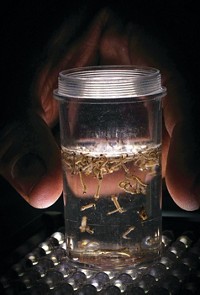Advertisement
Grab your lab coat. Let's get started
Welcome!
Welcome!
Create an account below to get 6 C&EN articles per month, receive newsletters and more - all free.
It seems this is your first time logging in online. Please enter the following information to continue.
As an ACS member you automatically get access to this site. All we need is few more details to create your reading experience.
Not you? Sign in with a different account.
Not you? Sign in with a different account.
ERROR 1
ERROR 1
ERROR 2
ERROR 2
ERROR 2
ERROR 2
ERROR 2
Password and Confirm password must match.
If you have an ACS member number, please enter it here so we can link this account to your membership. (optional)
ERROR 2
ACS values your privacy. By submitting your information, you are gaining access to C&EN and subscribing to our weekly newsletter. We use the information you provide to make your reading experience better, and we will never sell your data to third party members.
Environment
WHO Endorses Indoor Spraying With DDT
Controversial pesticide is safe and effective against malaria, world health body says
by Bette Hileman
September 19, 2006
| A version of this story appeared in
Volume 84, Issue 39

On Sept. 15, the World Health Organization strongly endorsed the indoor spraying of DDT to control malaria-carrying mosquitoes in developing countries. At a press conference, WHO spokesmen repeatedly called the pesticide "safe."
The U.S. and other industrialized countries banned outdoor spraying of DDT in the early 1970s because of its environmental toxicity, and for many years WHO did not promote its use for malaria control. But after DDT use was restricted, malaria resurged, and the disease now kills more than 1 million people per year, mostly children in Africa.
A number of malaria-plagued African countries—Eritrea, Ethiopia, Madagascar, Mauritius, Mozambique, Namibia, South Africa, Swaziland, Zambia, and Zimbabwe—had already been using DDT for interior residual spraying to prevent malaria. But seven others, including Uganda, where malaria is endemic, have refused to use it.
Arata Kochi, who leads WHO's global malaria program, said at the press conference: "One of the best tools we have against malaria is indoor residual house spraying. Of the dozen insecticides WHO has approved as safe for house spraying, the most effective is DDT." The small amounts of DDT used for indoor spraying are not dangerous, he claimed.
WHO's announcement is highly controversial, however. Some environmental organizations, such as Environmental Defense, which campaigned to phase out DDT in the 1960s and 1970s, now support its use for interior spraying. Other groups, such as Beyond Pesticides, say dependence on DDT will cause greater long-term problems than would other methods of malaria control. It believes "it is possible to effectively fight malaria without poisoning future generations of children in malaria hot spots."
Indeed, WHO's announcement comes at a time of increasing reports of potential human health threats from DDT. For example, at the recent American Chemical Society national meeting in San Francisco, researchers presented evidence that past exposure to the pesticides DDT or dieldrin may speed up the development of Parkinson's disease. There is also evidence that infants exposed to DDT in the womb may experience slow or stunted mental or physical growth (C&EN, July 24, page 30).




Join the conversation
Contact the reporter
Submit a Letter to the Editor for publication
Engage with us on Twitter